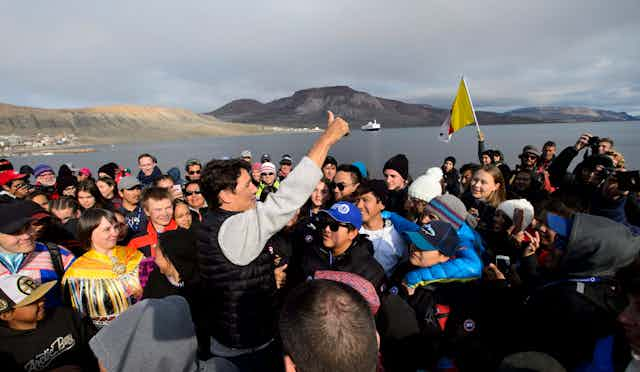The relationship between Indigenous Peoples and Canadians seems to have captured the public’s attention over the past four years, particularly following the release of the recommendations of the Truth and Reconciliation Commission as well as the National Inquiry into Missing and Murdered Indigenous Women and Girls.
Justin Trudeau’s government has also ostensibly prioritized these issues, with the prime minister asserting:
“No relationship is more important to me and to Canada than the one with Indigenous Peoples.”
But has there been attention paid to Indigenous issues by party candidates during the current election campaign? More specifically, will Canada’s relationship with Indigenous Peoples be treated as a matter of national interest, or will most of the attention come from ridings with a significant proportion of Indigenous voters?

According to our mid-campaign analysis, it’s fair to conclude that most settler candidates aren’t considering the relationship important. Our research aggregates tweets written by 735 candidates from five political parties (Liberal, Conservative, NDP, Green and Bloc Québécois) on Twitter.
At mid-campaign, of the 28,338 tweets by these candidates, only two per cent of them made reference to Indigenous issues. And although reconciliation was the focal point of the Trudeau government’s Indigenous policy, it only ranks 11th among the most discussed topics, far behind issues such as water, climate and housing.
Sporadic attention
In addition, the attention has also been sporadic, with most of the tweets the result of the leaders’ debate organized by Maclean’s and Citytv on Sept. 12, and a climate proposal announcement by the Liberals on Sept. 24.
Candidates were active the day after the debate, posting numerous messages on Twitter, as well as the day of the Liberal announcement and the day after.

The attention paid to Canada’s relationship with Indigenous Peoples also varied depending on partisan affiliations. Here, the amount of attention granted to these issues followed the left-right ideological continuum.
The further left on the spectrum, the more attention was paid to Indigenous issues in the political messaging. Hence, the Conservative Party trailed all other parties by a considerable margin:

Other indicators suggest a geographically fragmented situation, and that issues related to Canada’s relationship with Indigenous Peoples are not treated as national interest issues.
A majority of tweets originated from candidates running in ridings with a significant proportion of Indigenous voters. For example, candidates in ridings located in the northern areas of provinces, such as Timmins-James Bay, Labrador, Desnethé-Missinippi-Churchill River, were quite active in communicating on Indigenous issues. We see a similar trend in some urban ridings with large Indigenous populations, like Vancouver Centre, Regina-Wascana, Winnipeg Centre.
Looking for votes?
This observation indicates that social media posts were aimed at attracting the support of a key demographic that could tip the balance in specific ridings. Indigenous issues have not yet been raised by the majority of candidates to the status of national interest issues able to mobilize voters from across the country.
We think this is short-sighted, and fails to serve the urgent needs for safety, health, wellness and prosperity in Indigenous communities and to improve relations between Indigenous and non-Indigenous people in Canada.
It’s also strange to see the high-level national attention paid to the Truth and Reconciliation Commission and the Inquiry into Missing and Murdered Women by many politicians has dwindled during an election campaign.
Campaigns offer the opportunity to debate issues of national interest, and reconciliation with Indigenous People should be front and centre this election campaign. Let’s hope that political parties do better in the second half of the campaign.
[ You’re smart and curious about the world. So are The Conversation’s authors and editors. You can read us daily by subscribing to our newsletter. ]

